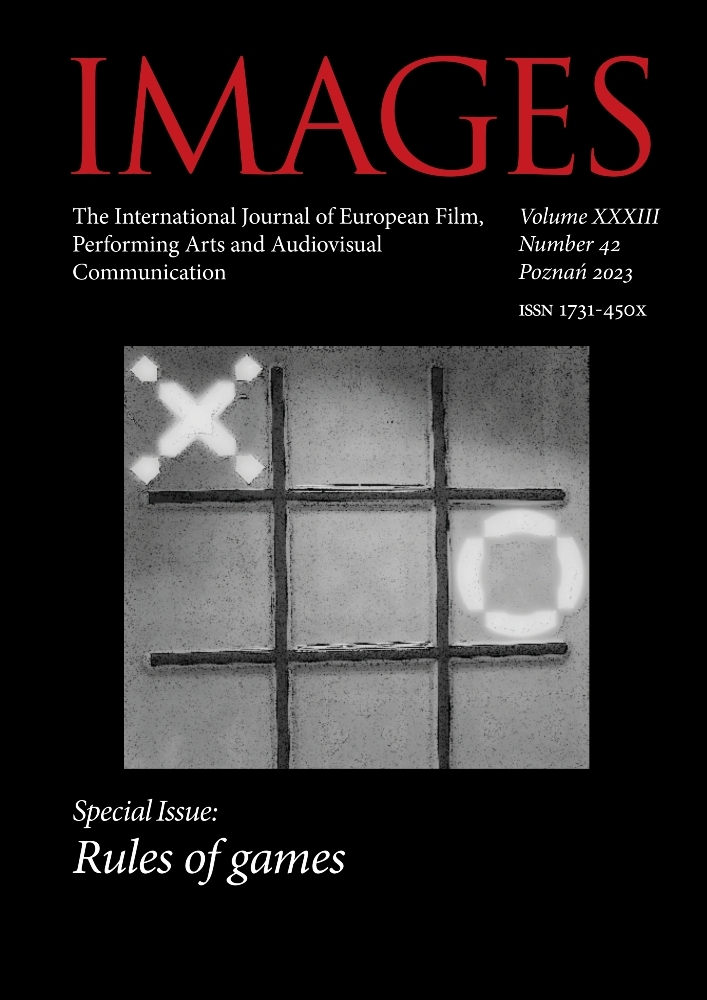Abstract
The article discusses selected aspects of the 2020 game Tell Me Why, focusing on particular gameplay mechanics pertaining to player choices and the manner in which they influence player emotions, as well as on the representation of trans experience in the game. The authors draw both on affect theory and on approaches derived from game studies concerning the presence of emotions in gameplay. In the final part of the text, trans representation in Tell Me Why is analysed and juxtaposed with the readings typically found in the game’s reviews.
References
Abbott T.B., The History of Trans Representation in American Television and Film Genres, London 2022 DOI: https://doi.org/10.1007/978-3-030-97793-1
Ahmed S., The Cultural Politics of Emotion, Edinburgh 2014 DOI: https://doi.org/10.4324/9780203700372
Anable A., Playing with Feelings. Video Games and Affect, Minneapolis – London 2018 DOI: https://doi.org/10.5749/j.ctt20mvgwg
Baldwin K., Virtual Avatars: Trans Experiences of Ideal Selves Through Gaming, “Markets, Globalization & Development Review” 2019, no. 3(3). DOI: https://doi.org/10.23860/MGDR-2018-03-03-04
Bopp J.A. et al., Exploring Emotional Attachment to Game Characters, [in:] CHI PLAY ’19 – Proceedings of the Annual Symposium on Computer-Human Interaction in Play, 2019, pp. 313–324. DOI: https://doi.org/10.1145/3311350.3347169
Clough P.T., Introduction, [in:] The Affective Turn: Theorizing the Social, eds. P.T. Clough, J. Halley, Durham – London 2007, pp. 1–33 DOI: https://doi.org/10.2307/j.ctv11316pw.5
Cohen J., Defining Identification: A Theoretical Look at the Identification of Audiences With Media Characters, “Mass Communication & Society” 2001, no. 4(3), pp. 245–264. DOI: https://doi.org/10.1207/S15327825MCS0403_01
Cole T., Cairns P., Gillies M., Emotional and Functional Challenge in Core and Avant-garde Games, [in:] Proceedings of the 2015 Annual Symposiumon Computer-Human Interaction in Play, 2015, pp. 121–126. DOI: https://doi.org/10.1145/2793107.2793147
Cole T., Gillies M., Thinking and Doing: Challenge, Agency, and the Eudaimonic Experience in Video Games, “Games and Culture” 2021, no. 16(2), pp. 187–207. DOI: https://doi.org/10.1177/1555412019881536
Elson M. et al., More Than Stories With Buttons: Narrative, Mechanics, and Context as Determinants of Player Experience in Digital Games, “Journal of Communication” 2014, no. 63(3), pp. 521–542 DOI: https://doi.org/10.1111/jcom.12096
Hyun Kim M., Tell Me Why Is the First Major Video Game to Feature a Transgender Main Character, them, 11.09.2020, https://www.them.us/story/tell-me-why-video-game-trans-character (accessed: 12.06.2022)
Isbister K., How Games Move Us: Emotion by Design, Cambridge, MA 2016 DOI: https://doi.org/10.7551/mitpress/9267.001.0001
Jagoda P., McDonald P., Game Mechanics, Experience Design, and Affective Play, [in:] The Routledge Companion to Media Studies and Digital Humanities, ed. J. Sayers, New York 2018, pp. 174–182 DOI: https://doi.org/10.4324/9781315730479-17
Lankoski P., Heliö S., Ekman I., Characters in Computer Games: Toward Understanding Interpretation and Design, [in:] DiGRA Conference, 2003, http://www.digra.org/wp-content/uploads/digital-library/05087.10012.pdf (accessed: 12.06.2022)
Mathys Q., Tell Me Why Portrays Trans Characters in Healthier Way Than The Last of Us 2, Game Rant, 2.09.2020, https://gamerant.com/tell-me-why-last-us-2-trans-character-representation (accessed: 24.02.2022)
McKay H., Tell Me Why Review – Finally, trans representation done right, Checkpoint Gaming, 28.08.2020, https://checkpointgaming.net/reviews/2020/08/tell-me-why-review-finally-trans-representation-done-right (accessed: 24.02.2022)
Ngai S., Ugly Feelings, Cambridge, MA – London 2005 DOI: https://doi.org/10.4159/9780674041523
Seigworth G.J., Gregg M., An Inventory of Shimmers, [in:] The Affect Theory Reader, eds. M. Gregg, G.J. Seigworth, Durham – London 2010, pp. 1–25
Shouse E., Feeling, Emotion, Affect, “M/C Journal” 2005, no. 8(6). DOI: https://doi.org/10.5204/mcj.2443
Staszak A.,“You can’t let yourself be defined by the parts that are broken”: Immersion, Traumatic Memory and the Representation of PTSD in Tell Me Why, “Currents” 2021–22, vol. 7–8, pp. 177–190, http://www.currents.umk.pl/files/issues/7/staszak-defined.pdf (accessed: 6.11.2022)
The Affective Turn: Theorizing the Social, eds. P.T. Clough, J. Halley, Durham – London 2007
The Affect Theory Reader, eds. M. Gregg, G.J. Seigworth, Durham – London 2010
https://www.tellmewhygame.com/faq (accessed: 10.09.2022)
Tell Me Why (Don’t Nod Entertainment, 2020)
License
Copyright (c) 2023 Katarzyna Marak, Nelly Strehlau

This work is licensed under a Creative Commons Attribution 4.0 International License.

